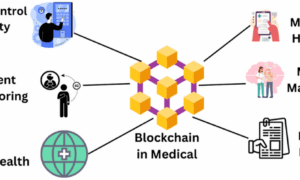Photo Credit: Singularity University
Future Health Starts Now: What Business Leaders Need to Know About Biotech
As the boundaries between biology, information, and engineering blur, biotechnology is accelerating toward the mainstream at an unprecedented pace. Breakthroughs in gene editing, regenerative medicine, and personalized therapies are reshaping the future of healthcare, and with it, entire industries and global economies. For CEOs, policymakers, and executive decision-makers, cultivating a foundational understanding of biotech is no longer optional; it’s vital. Here’s why.
1. Biotechnology is rewriting the future health playbook.
Over the past decade, innovations such as CRISPR and cell and gene therapies have progressed from the lab to clinical reality. In December 2023, the FDA approved the first CRISPR-based treatments for sickle cell disease. Gene therapies like Casgevy and Lyfgenia offer hope for sickle cell disease but come with steep price tags—$2.2 million and $3.1 million per dose—making them unaffordable for many health systems. These are not incremental improvements; they are potentially curative “one‑and‑done” medicines.
Meanwhile, regenerative medicine is making strides. Advances in gene therapy for bone and tissue repair are unlocking possibilities once thought impossible, such as repairing congenital disabilities or reversing the effects of severe injuries. Stem cells engineered to evade immune detection could become universal donor therapies. These developments are reshaping entire value chains, and leaders need the fluency to assess risks, returns, and societal impact.
2. Markets are booming, but volatility remains.
Biotech isn’t just transformative—it’s a boom. The global biotech market is projected to expand from $1.74 trillion in 2025 to $5 trillion by 2034, powered by gene editing, AI-powered drug discovery, and precision medicine. However, fortune often lies on the other side of failure: regulatory delays, trial setbacks, patent battles, and commercialization barriers remain significant. To stay ahead of these fast-paced advancements, business leaders need to develop biotech literacy to steer investments wisely, rather than merely following hype.
Photo Credit: Artem Podrez | Pexels
3. Biotech is more than medicine—it’s a cross‑sector catalyst.
Biotech breakthroughs resonate far beyond healthcare. The field of bioconvergence integrates biology, engineering, and computational science to reimagine food, materials, energy, and environmental solutions. From lab-grown meat to bio-based materials and carbon-capturing microbes, biotech is set to redefine entire industries.
Executives in agriculture, chemicals, retail, or energy who ignore this shift risk being disrupted, including by new entrants leveraging biotech to optimize supply chains, resource usage, or sustainability.
4. Science informs strategy.
Biotech is moving forward fast. Here are key areas where an understanding of future health tech will make a difference for organizations and businesses:
- Policy & Regulation: Gene-editing raises unique ethical dilemmas. Business-friendly regulation must strike a balance between trust and innovation. Leaders need literacy in science to advocate for and navigate frameworks effectively.
- Venture & Corporate Investing: Strategic timing—knowing when to back disruptive firms versus platform technologies—requires expertise.
- Partnerships & IPOs: Biotech’s ecosystem is network-based. Deep knowledge enables stronger collaborations with startups, academic institutions, and regulatory bodies.
Biotech should no longer be treated as an exclusively scientific domain. Instead, leaders must integrate biotech into their strategic thinking.
5. Biotech fluency is essential.
Understanding biotech doesn’t require a PhD—but it does require informed engagement. Execution-ready pathways include:
On-demand programs such as Singularity University’s Future of Biotech immerse senior leaders in scientific and strategic implications. Suited for CEOs, investors, and policymakers, they fast-forward participants into the next five to 10 years of biotech innovation and mindset.
This program is more than a conference. It’s a deep-dive, interactive executive course with over nine hours of content that teaches not just what biotech can do, but also how to leverage its insights with emerging tools and trends. Participants will learn how to:
- Spot biotech-driven business risks and opportunities.
- Understand policy dynamics shaping the market.
- Build cross-sector strategies—from future health to sustainability.
- Engage diverse stakeholders—from researchers to regulators.
6. Biotech literacy is a competitive advantage.
The biotech revolution isn’t hypothetical—it already affects portfolios, operational models, and long-term strategy. Consider:
| Sector | Biotech Impact |
| Pharma | New therapies—gene editing, cell therapy |
| Agriculture | CRISPR-enhanced crops for productivity and climate |
| Environmental | Microbial solutions to mitigate pollution |
| Consumer Goods | Bio-based materials and sustainable beauty |
Biotech fluency will help leaders capture transformative inflection points and maintain a leading edge in policy and investment discussions.
7. Take the Lead.
In a world where biology is becoming programmable, leadership itself must evolve. Executives and policymakers can no longer afford to silo biotech knowledge within scientific departments. Instead, they must embrace a mindset shift—one that treats biology as a core pillar of business strategy, innovation, and resilience.
So what does it look like to “lead with biology?”
It starts with curiosity—being willing to ask what’s possible and where biology intersects with your sector. It requires commitment to invest in upskilling, partner with experts, and question outdated assumptions. And it demands collaboration—working across disciplines and industries to solve complex problems using biotechnology as a tool.
Here are five actionable steps business leaders can take right now:
- Build awareness – Host biotech briefings or workshops with scientific advisors to educate your executive team.
- Invest in an education program – Enroll in an executive education experience like Singularity University’s Future of Biotech to gain structured, actionable insights.
- Incorporate biotech trends into scenario planning – Evaluate how these trends might disrupt or enhance your operations in the next five to 10 years.
- Engage early with regulators and stakeholders – Ensure your organization has a voice in shaping ethical and policy frameworks.
- Encourage a culture of experimentation – Support pilot projects or intrapreneurial ventures that explore biotech applications in your space.
Ultimately, the future of health—and business—is being built in labs, coded in genes, and shaped by ideas once considered science fiction. Whether you lead a startup, a multinational corporation, or a government agency, now is the time to get smart about biotech.
Because the leaders who understand the science will be the ones who shape the future.


































